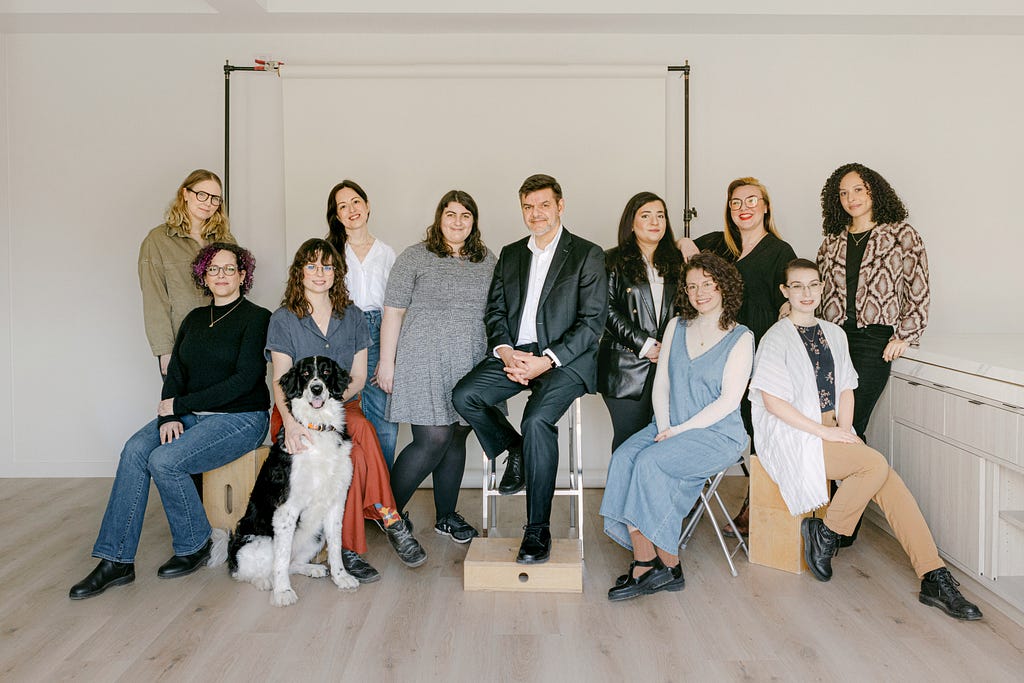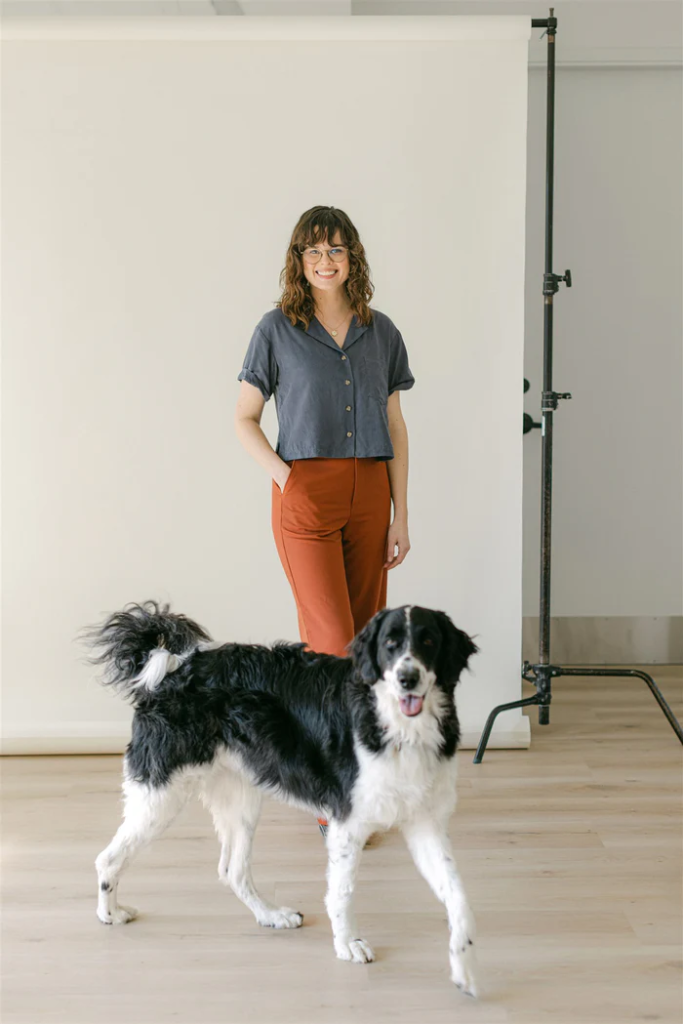Kesha Frank Of FTJCo: Five Strategies Our Company Is Using To Tackle Climate Change Or Become More Sustainable
…Slow is smooth and smooth is fast. When you’re working on a tight deadline, take a deep breath, focus and move with purpose. If you’re intentional about your movements, you’ll have time to spare on the other end…
I had the pleasure of interviewing Kesha Frank. Kesha is the Co-CEO ,Head of production, goldsmith and gemsetter at FTJCo. As a 5th generation artist, Kesha is honoured to produce works of art that become part of the wearer’s identity. After joining FTJCo in 2015, she realised very quickly that this had the potential to be her forever home. It’s an open secret that the jewellery industry is a misogynistic space. She made it her personal mission to make FTJCo a home for strong, talented, and opinionated people who experience misogyny. She’s immensely proud to look around at the people she sees everyday knowing she’s well on her way to making that dream a reality. Kesha has held positions on the RJC board of standards, has spoken at OECD on gender issues within the metal and mineral supply chains, and crafted the first piece of work in the world from Just Gold. Her community at FTJCo is her pride, joy, and raison d’être.
FTJCo was founded as the Fair Trade Jewellery Company in 2006. FTJCo jewellery is crafted on-site at their Toronto studio by a talented team of female goldsmiths, who do everything from alloying gold to gem-setting, all in-house. As a mission-driven brand, FTJCo specializes in ethically-sourced metals, diamonds and gems. Their sourcing claims are validated by third-party certifications and affiliations, and they are proud to be an Employee-Owned, Certified B Corp and Living Wage company. FTJCo is Rainbow Registered and a member of the Responsible Jewellry Council. FTJCo offers both ready to wear and custom jewellery in 18K gold and platinum, while their Parliament collection of ‘everyday jewellery’ features ready to wear pieces in 14K gold and silver. FTJCo has a robust collection of unique diamonds, sapphires and other gems, from mined, recycled, and lab grown sources; often taking inspiration for pieces from the beautiful gems themselves.
Thank you so much for joining us. Can you tell us a story about what brought you to this specific career path?
I always knew that to truly feel fulfilled I needed to be “making” as a career — the classic office environment is not for me! When it came time to go to university, the only field that felt reasonable or genuine for me to study was art. Doing a Bachelor of Fine Arts was academically challenging; I’ve never been a great writer or researcher, but when these endeavors were balanced with ‘making’ I was able to navigate my way through, successfully graduating and getting my degree. My studio work developed into a very reflective and somewhat meditative practice of studying my family history and trying to understand how those stories impact who I am and how I feel and behave as a person. This really helped me identify my strengths. Building on my strengths lead me to study goldsmithing, and then to further develop my specialization of gem setting.
What is the mission of your company? What problems are you aiming to solve?
Our company’s mission has always been to make positive change for people and planet, with a special focus on transparency, while producing the highest-quality fine jewellery. Some of the biggest problems in our industry stem from the fact that so much of the value of jewellery is realized at the end of the supply chain, while so little remains with the mineral producing countries at the start. We’re always looking for ways we can subvert this norm, because we believe that mineral-rich communities should be able to safely profit from their resources, rather than be exploited. Our industry also has some of the biggest offenders of greenwashing and this is only becoming worse as sustainability, the environment, and working conditions become a growing concern for consumers. We try to combat that greenwashing by being vocal about what we know and what we don’t know about our materials, and when we can’t find a gem or metal that meets our high standards, we endeavour to build the supply chain that will bring it to market. We are always looking for new, better, sources for our raw materials, which means we’re constantly re-evaluating our offering, and making strides every year. When we make a claim about any of our materials, it’s because we have the data and evidence to support it; if we don’t feel the data supports those claims, we don’t repeat them.
Can you tell our readers about the initiatives that you or your company are taking to address climate change or sustainability? Can you give an example for each?
Our whole business model is a case for sustainability! Big picture, we take a proactive approach by examining our current supply chains against new options and then choose the best option with the most impact. That means we must be pretty nimble as a company and are constantly learning. It fosters an environment where everyone can voice concerns about material sourcing, which makes for a well-rounded and balanced approach, and equitable company culture. There are also many other subtler ways that sustainability is woven into the fabric of our company. For example, we encourage clients to reuse and repurpose gems that they already have, and to recycle pieces that can’t be maintained by creating financial incentives for them to do so. We also design our pieces with wear and long-term maintenance in mind, creating pieces with longevity that are therefore inherently more sustainable.
How would you articulate how a business can become more profitable by being more sustainable and more environmentally conscious? Can you share a story or example?
I think it works for us because clients can see we genuinely do care about changing the industry we work in. People shop with us because we have a long history of agitating for change in our supply chains and we don’t just do it because it’s a trendy consumer demand, we’re genuine. And for many clients, that values-alignment is worth a lot. Not only do our practices promote environmental sustainability, but these same choices lead to a sustainable business model — working with recycled and responsibly sourced gold means that we will continue to have gold available to us for a very long time.
The youth led climate strikes of September 2019 showed an impressive degree of activism and initiative by young people on behalf of climate change. This was great, and there is still plenty that needs to be done. In your opinion what are a few things parents should do to inspire the next generation to become engaged in sustainability and the environmental movement? Please give a story or an example for each.
When I think back on my childhood, I can see the ways in which my parents exposed me to the world that inform who I am and what I believe in today. We know our brains aren’t wired to remember or think about people we’ll never meet and places we’ll never see. But because of the choices we make and the way our society is structured, we do have an impact on them and on each other. Growing up I was fortunate enough to be exposed to so many different versions of the human experience, I got to see the beautiful variety that makes humanity and our planet so special. I wish there was a way for us to encourage thinking about our impact beyond what we can see, beyond what we might experience in our lifetimes.
What are your “5 Things I Wish Someone Told Me Before I Started” and why?
1. Know your strengths and play to them.
2. When you’re faced with a problem, the hardest solution is probably the right one. This was advice given to me when I was studying goldsmithing, and it’s particularly useful when accessing what needs to be done for a jewellery repair. Whatever seems like the most amount of work is probably the right thing to do for the piece and the person.
3. A good high polish will go a long way.
4. Just because something has always been done a certain way, doesn’t mean you need to keep doing it that way, too. Push the envelope!
5. Slow is smooth and smooth is fast. When you’re working on a tight deadline, take a deep breath, focus and move with purpose. If you’re intentional about your movements, you’ll have time to spare on the other end.
None of us are able to achieve success without some help along the way. Is there a particular person who you are grateful towards who helped get you to where you are? Can you share a story about that?
When I was in college studying goldsmithing we had a studio technician who was a force to be reckoned with. She had a fierceness that was inspiring to me at the time, and that I still try to channel to this day. She kept that whole department running smoothly in the face of constant obstacles from students, faculty and the administration. And she did it with a grace that I wish more people had access to. This technician was resourceful in creative ways, she cultivated interdepartmental relationships that were mutually beneficial, and when she was passionate about a subject she would work to learn and educate herself to better those around her; I was lucky enough to be one of those people. She introduced me to FTJCo and was instrumental in getting me to where I am today. I still think about her all the time. I am so grateful to have had her influence on my early career and to call her a friend today.

You are a person of great influence and doing some great things for the world! If you could inspire a movement that would bring the greatest amount of good to the greatest amount of people, what would that be? You never know what your idea can trigger. 🙂
Something we do here at FTJCo, that I also apply in my own life, is “trust but verify.” I think it’s a great way to combat greenwashing and to avoid falling for it. For example, if a company says they use fair labor practices, that’s great! Now show me the evidence to support this claim. Do you have certifications? Are your claims audited by a third party? If there isn’t a section on that company’s website that validates their claims or provides evidence, then it’s really just words on a page and I’m not putting too much stock into it. So, don’t fall for the greenwashing, and ask to see the receipts!
Do you have a favorite life lesson quote? Can you tell us how that was relevant to you in your own life?
Mind your own business. In your personal life, in your professional life. I find it easy to get worked up over companies in our industry misrepresenting information, making unfounded or just patently false claims… Similarly, it’s easy to compare yourself to others and feel like you’re falling short. If you focus on yourself and the areas within your control, positive growth will come, and it will be all the more fulfilling.
What is the best way for our readers to continue to follow your work online?
You can follow us on Instagram (@ftjco), Tiktok (ftjco), Youtube (@FTJCo) or on our website (www.ftjco.com) to learn more about us, see our beautiful jewellery, and stay up-to-date with exciting new projects!
Kesha Frank Of FTJCo: Five Strategies Our Company Is Using To Tackle Climate Change Or Become More… was originally published in Authority Magazine on Medium, where people are continuing the conversation by highlighting and responding to this story.
